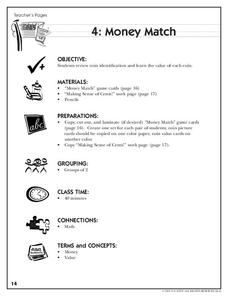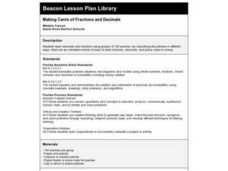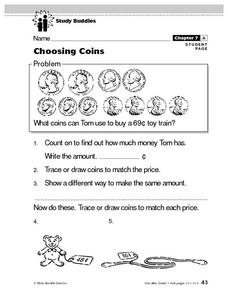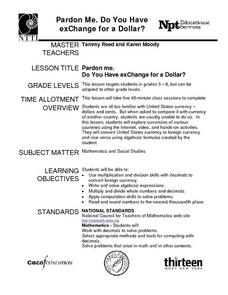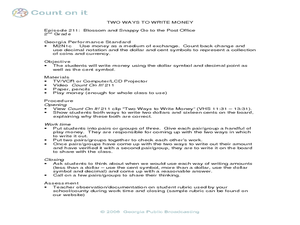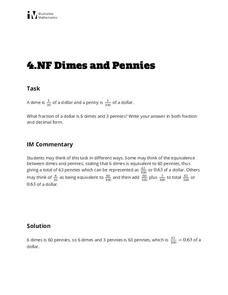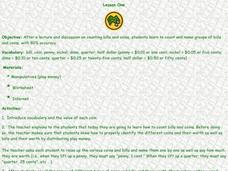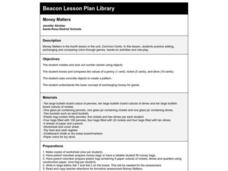Illustrative Mathematics
Money in the Piggy Bank
It's time to crack open that piggy bank and see what's inside. First, count up the pennies, nickels, dimes, and quarters, identifying what fraction of them are dimes. Then calculate the total value of the coins, writing another fraction...
Curated OER
Stamping Coins
Learners demonstrate that they can use a variety of coin combinations to make a single amount. They study all the ways to make 50 cents using coins using different coins.
Curated OER
Money Match
Playing a game can be educational, pupils use this matching activity to identify coins and their values. This is a great way to have learners practice their money sense.
Curated OER
Counting Money and Making Change
Students count collections of coins and one-dollar bills. They solve problems and learn to use the dollar sign ($) with the decimal point to represent money amounts. This lesson is important as a foundation for future math concepts in...
Curated OER
Making Cents of Fractions and Decimals
Students explore decimals and fractions using groups of 100 pennies. By classifying the pennies in different ways, there are an unlimited number of ways to learn fractions, decimals, and place value in money. This is a good, hands-on...
Curated OER
Choosing Coins
In this mathematics worksheet, 1st graders identify what coins can be used to buy a toy train. Then they count out how much money is given and write that amount in cents. Students also trace or draw the coins to match each price listed.
Curated OER
Show Me The Money
Third graders explore the value of U.S. money. In this money lesson, 3rd graders print out pictures of money from the Internet and create play money. The students will play a game in which they display the amount of money called out by...
Curated OER
Musical Change
Young learners record observations about different coin denominations and create a song about coins to the traditional song, "The Wheels on the Bus." This lesson plan is based on the Tennessee Quarter Reverse, and has all sorts of...
Curated OER
Pardon Me. Do You Have Change For a Dollar?
Upper elementary and middle school learners explore currencies from a variety of countries. They use the Internet, video, and engage in hands-on activities. They practice converting U.S. currency to foreign currency and vice versa. This...
Curated OER
Adding and Subtracting Money
Students investigate U.S. currency by pretending to buy food. In this money lesson, students discover the vocabulary and value for each U.S. coin, then add the amounts in dollars and cents of food items they wish to purchase....
Curated OER
Two Ways to Write Money
Second graders complete activities to learn about money and how to write money. In this money lesson plan, 2nd graders watch a video about ways to write money. Students work in groups with play money and come up with two ways to write...
Illustrative Mathematics
Dimes and Pennies
Help your fourth graders make cents out of fractions and decimals with this short word problem. After learning that dimes are one-tenth and pennies one-hundredth of a dollar, students write a fraction and decimal for a given number...
Curated OER
Managing My Money
Second graders use The Berenstain Bears' to learn about money management. In this money management lesson, 2nd graders read The Berenstain Bears' Dollars and Sense book and complete the 'Rainy Day' worksheet. Students then discuss the...
Curated OER
Counting Money
Students learn how to count money. In this money lesson, students review the names and values for each coin. Students learn how to count bills and coins and how to write amounts of money. Students complete web...
Curated OER
Combining Coins to Make Equal Monetary Amounts
Third graders determine how to make equivalent amounts of money using different sets of coins. For this money lesson, 3rd graders review money vocabulary and coin values before determining how to count bills and coins in different sets...
Curated OER
What's All this Money Madness?
Second graders examine the value of money. In this money lesson, 2nd graders read the book Money Madness by David A. Alder and watch Brain Pop Jr. videos. Students discuss why we need money and how people earn money. Students each...
Curated OER
Smart- Counting Coins
Students discover the name and value of coins. In this counting money lesson, students identify heads and tails of coins and the value of each coin. Students visit websites and play games. Students then write a poem about money.
Curated OER
Saving Makes Cents
Students identify ways families save money. For this financial lesson, students read the book A Chair for My Mother and discuss ways to save money. Students identify coin values and practice counting money.
Curated OER
ADULT ESOL LESSON PLAN--Concepts of Time and Money
Pupils identify different denominations of United States currency and symbols associated with money and reading prices. In addition, in pairs they identify examples of currency from newspapers and magazines.
Curated OER
Money Talks Canadian Money
Learners use newspapers, games and journal writing activities to examine the importance of money and the role it plays in daily life. They complete several math problems, fill out worksheets and practice changing varying amounts.
Curated OER
Coins
Second graders observe and demonstrate how to count the value of assorted coins. They discuss a story from their Math Storybook, and as a class solve a variety of problems using activity sheets. Students then independently complete a...
Curated OER
Money Matters
Students practice spending money by completing math word sentences. In this economics lesson, students utilize problem solving strategies to complete word problems written on the board involving making purchases with money....
Curated OER
Counting Coins
Learners identify the different types of coins. They practice buying objects in the classroom with their coins. They must use different combinations of coins in all situations.
Curated OER
Money Matters
Students play a game called Money Matters using cut out representatives of pennies, nickels, and dimes.


